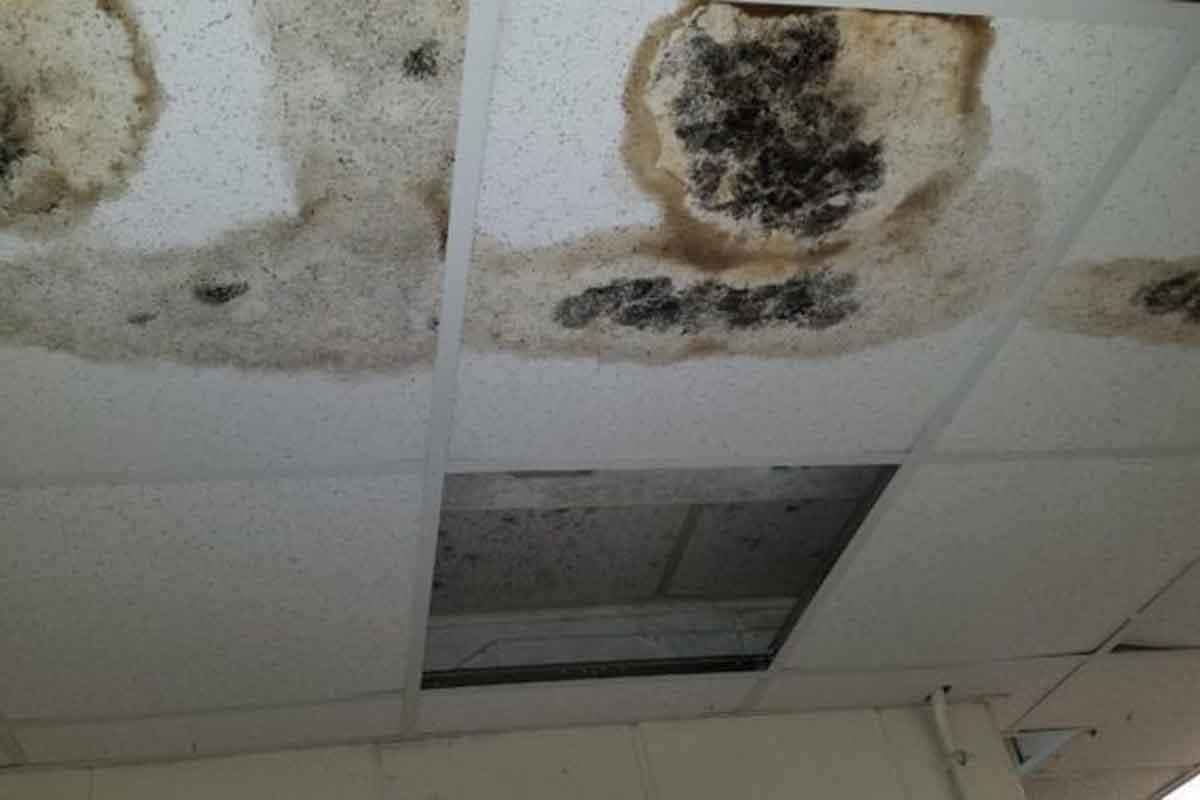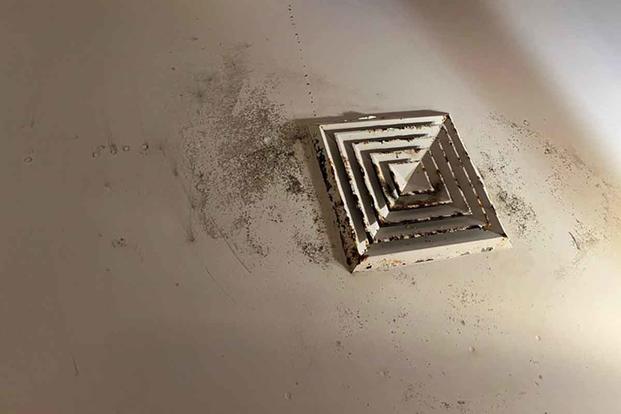
A soldier at Fort Carson, Colorado, was excited to arrive at his new duty station last year with his family. But the soldier soon knew something was wrong.
“Right away, my wife and both my kids started getting just constantly sick,” the noncommissioned officer told Military.com on the condition of anonymity, because he was not authorized to talk to the press. “My wife is pregnant, and she was sick for about a month and a half straight.”
He smelled something rotten and moldy in the house, and found the crawl space flooded with standing water that appeared to have been there a long time. His wife was eventually rushed to the emergency room after running a high fever and having difficulty breathing.
Read Next: First Active-Duty Service Member Sentenced for Jan. 6 Hit with Lengthy Prison Time
“The baby was our biggest concern,” he said. “We shouldn’t be subjected to the grueling environment we have to go through [in the Army] and then come to a mold-infested home.”
His wife recovered after they moved to temporary housing, and the baby appears to be healthy. But most of their furniture and other belongings are laced with a moldy smell and will likely need to be replaced, potentially costing the family thousands of dollars.
Mold in military housing isn’t new, having haunted bases for decades. Despite repeated vows from military officials and privatized housing contractors to make sure troops don’t have to endure health hazards in their homes, unsafe conditions persist.

Congress is poised to try several approaches to fix the issue through the annual defense policy bill, but it’s unclear whether those changes will bring about solutions or become just another note in the ongoing crisis.
That the issues remain isn’t a surprise to lawmakers, after an April Senate investigation found that one of the biggest companies running military housing, Balfour Beatty Communities, continued to ignore residents’ concerns about hazardous living conditions even after pleading guilty last year to defrauding the Army, Air Force and Navy by manipulating maintenance records to obtain performance bonuses.
The Fort Carson soldier’s home is managed by Balfour Beatty, which runs more than 43,000 military homes and has been at the center of an ongoing scandal of poorly kept and sometimes dangerous housing for troops and their families.
Balfour Beatty did not immediately respond to a request to comment about the soldier’s accusations.
“We’re not perfect. We’ve never testified that we are a perfect organization,” Richard Taylor, the Dallas-based company’s president of facility operation, told lawmakers at a hearing on the housing conditions in April.
Exposure to moldy environments can cause numerous health issues ranging from a stuffy nose, wheezing and itchiness to fever and difficulty breathing, according to the Centers for Disease Control and Prevention. Those with underlying respiratory issues or who are immune compromised are susceptible to fungal infections and other severe reactions.

There are also preliminary studies from the CDC suggesting that mold exposure can cause memory loss and lethargy, but more research is needed. Young children’s exposure to mold could lead to asthma development.
But it isn’t just military housing. Barracks, which typically house unmarried junior enlisted, have also been plagued with unsanitary conditions for years. Soldiers are often tasked to maintain the barracks themselves, including dealing with mold despite having no formal training, those interviewed told Military.com.
The 1st Battalion, 9th Field Artillery, 3rd Infantry Division, at Fort Stewart, Georgia, has barracks two soldiers described as unlivable, with dirty floors and sinks and what appears to be mold on the ceilings and vents, based on videos and photos reviewed by Military.com.
“[I] feel the Army is putting soldiers effectively in conditions that would be unacceptable in any other environment,” one soldier stationed at Fort Stewart told Military.com, on the condition of anonymity.
A spokesperson for Fort Stewart did not respond ahead of publication to a request for comment about whether the installation is planning any major renovations or cleaning efforts.
Mold and other poor housing conditions are one of the largest concerns across the force and a leading cause for veterans and their families to recommend against joining the military, according to results of a survey of military families released last week.
Those findings come amid a major recruiting crisis faced by most of the services due to a confluence of issues such as greater scrutiny of a potential recruit’s medical background and outdated marketing tactics. In a memo Wednesday, top Army leaders painted a grim picture of the difficulty in filling the ranks with little optimism for near-term fixes, saying the force’s overall size will decrease by about 14,000 by the end of next year.
The Army in recent years have begun renovating many of its Cold War-era barracks and outright building new ones such as new facilities at Joint Base Elmendorf-Richardson, Alaska, and Fort Bliss, Texas.
But those efforts go only so far, and some lawmakers are looking toward better oversight over barracks and family housing.
Both the House and Senate versions of the annual defense policy bill have multiple provisions aimed at improving living conditions, addressing health concerns and cracking down on negligent landlords.
After a series of 2018 Reuters articles exposed systemic issues with privatized military housing such as mold, rodent infestations and shoddy repairs, Congress tried to tackle the issue in 2019 by requiring the Pentagon to issue an 18-point tenant bill of rights aimed at providing families with more negotiating power with the private companies. But lawmakers continue to be frustrated at the lack of progress in fixing housing.
Among the proposals being pushed this year, the version of the National Defense Authorization Act, or NDAA, passed last week by the House would create a registry of troops and their family members who have health issues caused by unsafe housing conditions. As part of creating the registry, the Pentagon would also have to give health screenings to troops and families who lived in unsafe housing.
The idea for a registry comes after the Defense Department inspector general in April finished an audit of medical conditions of residents in privatized military housing. The audit has not been publicly released because it contains “controlled unclassified information,” a designation critics say is often abused to conceal embarrassing information.
The version of the NDAA passed by the Senate Armed Services Committee in June, the full text of which was released this week, would require the Pentagon to enact the recommendations in the inspector general’s audit by March 2023. According to a report accompanying the Senate NDAA, those recommendations included ensuring the Army and Air Force fully list their inventories of privatized housing units in the military’s housing management system, implement a tool to track health and safety hazards in that system, and upload current and former resident information.
Both the Senate and House versions of the NDAA would also require landlords to disclose the presence of mold in a housing unit before a lease is signed.
The House bill would also create a “Military Housing Feedback Tool” for service members and their spouses to rate and compare areas such as safety, the timeliness of maintenance services and the responsiveness of management.
Meanwhile, the Senate bill would designate the assistant secretary of defense for energy, installations and environment as the “Chief Housing Officer,” as well as create a “Military Housing Readiness Council” to monitor compliance with laws such as the tenant bill of rights and recommend other policies to improve living conditions.
The full Senate must still pass its bill, and then the House and Senate have to reconcile the two bills before anything becomes law.
“It just feels like a slap in the face,” the Fort Stewart soldier told Military.com on the condition of anonymity. “We outspend every other country on the military. Where is all the money going?”
— Steve Beynon can be reached at [email protected]. Follow him on Twitter @StevenBeynon
— Rebecca Kheel can be reached at [email protected]. Follow her on Twitter @reporterkheel.
© Copyright 2022 Military.com. All rights reserved. This material may not be published, broadcast, rewritten or redistributed.
